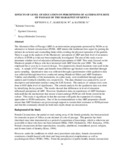EFFECTS OF LEVEL OF EDUCATION ON PERCEPTIONS OF ALTERNATIVE RITE OF PASSAGE OF THE MARAKWET OF KENYA

View/
Date
2014Author
KIPTIONY G. J1 ., KARIUKI M. W2 . & KATHURI N.3
Metadata
Show full item recordAbstract
The Alternative Rite of Passage (ARP) is an intervention programme sponsored by NGOs as an
alternative to female circumcision (FGM). ARP mimics the traditional rites aspect by putting the
initiates in seclusion and counselling them while avoiding the physical operation of the genitals.
There is a gap in the analysis of the Marakwets’ perception of ARP and their level of awareness
of effects of FGM as it has not been empirically investigated. The aim of this study was to
determine whether level of education influenced perceptions of ARP. This study focused on the
Marakwet people of Kenya who have interacted with ARP from the year 2000. The study
employed the ex post facto research design. Two purposively chosen locations were used in the
study. A sample of 415 males and females from different age brackets were identified through
quota sampling. Quantitative data was collected through a questionnaire while qualitative data
was collected through interviews conducted among Marakwet Elders and ARP Graduates.
Validity and reliability of the instruments, in a pilot study, were established through expert
opinion and Cronbach reliability test, respectively. The data obtained was analyzed by use of
descriptive and inferential statistics using the SAS System. The analysis of variance tests were
done at 0.05 alpha level of significance. The content analysis for the qualitative data was done
by identifying the key points. The results showed that differences in level of education
influenced perceptions of ARP. However, Qualitative data on experiences of ARP Graduates
indicated that the mechanisms that ensure women undergo FGM are still firmly rooted in the
culture. This study is significant in that the outcome will guide the expansion of existing
approaches to FGM eradication. One of the recommendations is that ARP proponents should
ensure that ARP Graduates are given enough support to sustain their resistance to FGM pressure
and that the community should not hold onto myths about un-circumcision.
